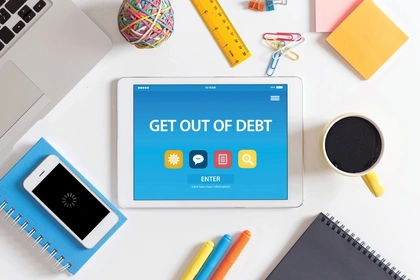What is persistent debt?
Persistent debt is defined by the FCA as having paid more in interest, fees, and charges than you’ve paid towards the amount you’ve borrowed. It’s worked out on an account-by-account basis, rather than looking at your overall financial situation. The FCA regulations on persistent debt apply to credit card, store card, or catalogue account borrowing over £200.
Only making the minimum payments required of you is a leading cause of persistent debt. This is because when you only pay the minimum, more of your payment goes towards the interest charged than it does towards repaying the amount you’ve borrowed.
If you’re in persistent debt, it could take you a long time to repay what you owe. You may also pay back a lot more than you originally borrowed.
How long does persistent debt last?
You can be in persistent debt for 36 months (three years) before your account provider must intervene. If you receive a persistent debt letter, you will already have been in persistent debt for at least 18 months.
What happens if you’re in persistent debt?
If you’re in persistent debt, you’ll receive letters from your account provider(s) that let you know this is the case. In these letters, your account provider will:
- Explain how increasing your payments affects your balance. They’ll show you different amounts you could pay to clear your balance more quickly and save money on interest.
- Encourage you to contact them if you can’t afford the payments they suggest.
- Tell you what could happen if your account remains in persistent debt for another 18 months.
- Provide the details of not-for-profit debt advisory bodies. This is so you can get help if you’re struggling.
Your account provider must send letters when your account has been in persistent debt for 18 months, 27 months, and 36 months. Some lenders may contact you more frequently. If you don’t speak to your lender or increase your monthly payments, then after 36 months, your lender must intervene and:
- Take action to address the amount you owe. This could include freezing the interest on your account, reducing the interest rate you pay, or setting up a repayment plan with you to clear your balance.
- As a last resort, suspend your card or account. Under FCA regulations, your account provider must restrict access to your account if you remain in persistent debt. You’ll receive plenty of warning before this happens. You should let your provider know if it would affect you negatively, for example, because you pay essential bills using your credit card. If your account is suspended, you won’t be able to borrow more. Any card linked to the account will stop working.
Does persistent debt affect your credit score?
Persistent debt shouldn’t affect your credit score in the short term. This is because you’re making the minimum payments required of you under your credit agreement. If you increase your monthly payments to pay off what you owe, then your credit score may even improve as your credit utilisation reduces.
However, if you can’t afford to increase your payments and your lender steps in, your credit score could be affected. If your lender freezes interest, suspends your account, or sets up an alternative repayment plan with you, they will likely report this to credit reference agencies.
How can you get out of persistent debt?
There are a few different things you can do to get out of persistent debt:
Increase your monthly payments
Increasing your monthly payments is among the simplest ways to get out of persistent debt. You can increase your payments by swapping from the minimum payment to a fixed payment amount. Or you can manually pay extra on top of your regular monthly payments.
In their letters, your account provider should give some examples of how paying certain amounts will affect your balance. This can help you decide how much to pay.
Get a balance transfer card
Balance transfer cards often come with a 0% interest period when you first get them. If you’re eligible for one of these, you could transfer the persistent debt to it. Then, you can repay as much of it as you can during the interest-free period.
If you can’t repay the entire balance before the end of the interest-free period, you will be charged interest on anything that’s remaining. You may also have to pay a balance transfer fee when you get the card. This is typically a percentage of the amount you’re transferring and will increase the amount you owe.
Consolidate your debts
If you’ve received persistent debt letters from multiple credit card, store card, and catalogue accounts, or have other borrowing as well, then consolidating your debts could be an option.
With a debt consolidation loan, you’ll borrow a lump sum that you then use to pay off some, or all, of your creditors. This could leave you with one loan, one payment to make, and one, often lower interest rate. Debt consolidation loans can be unsecured or secured. But you’ll need to own your home and have a mortgage to be eligible for a secured debt consolidation loan.
It’s important to think carefully before you decide what to do. Work out the cost of different options and seek advice if you need it.
Speak to your account provider
If you can’t afford the increased payments your account provider recommends, speak to them. They may be able to work out a different payment amount that you can afford, which still helps you get out of persistent debt in a reasonable timeframe.
If you can’t afford to pay more than the minimum, they’ll have other options that could help, too.
Seek independent advice
If you’re struggling to keep up with the minimum payments on your accounts and you have other debts, then seeking free, unbiased advice could help. You can get this from:
Disclaimer: We make every effort to ensure content is correct when published. Information on this website doesn't constitute financial advice, and we aren't responsible for the content of any external sites.






